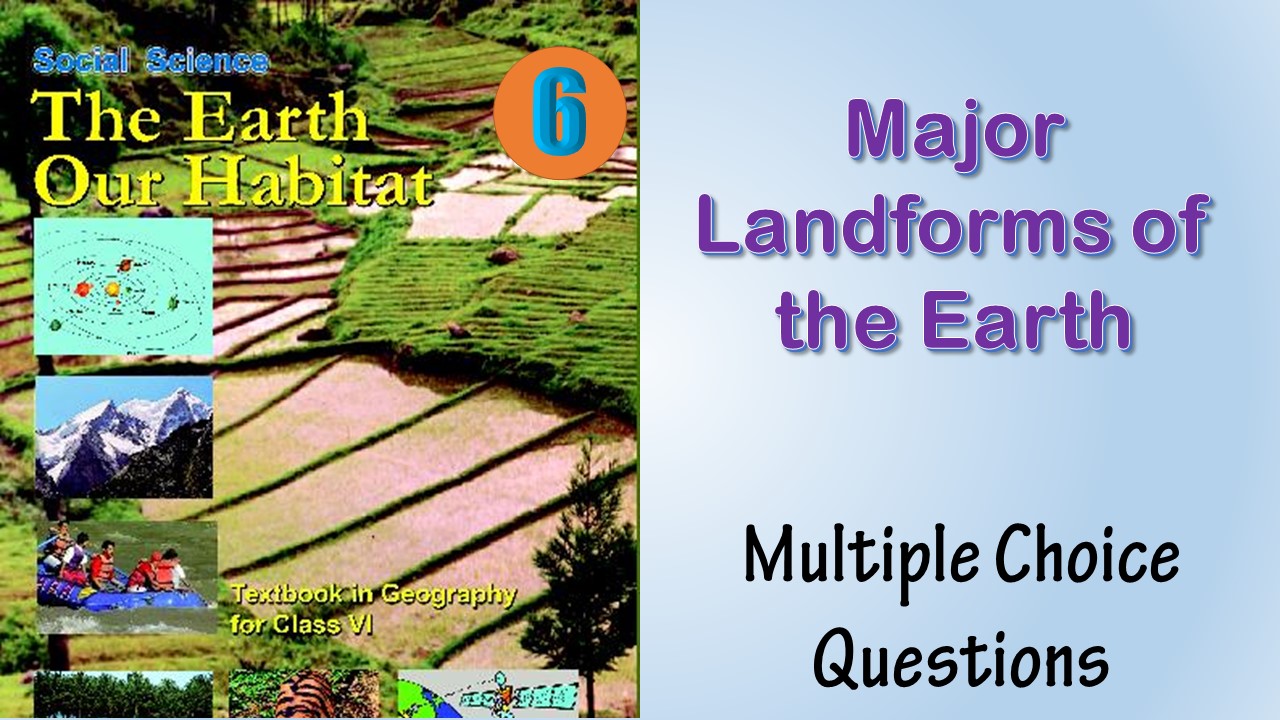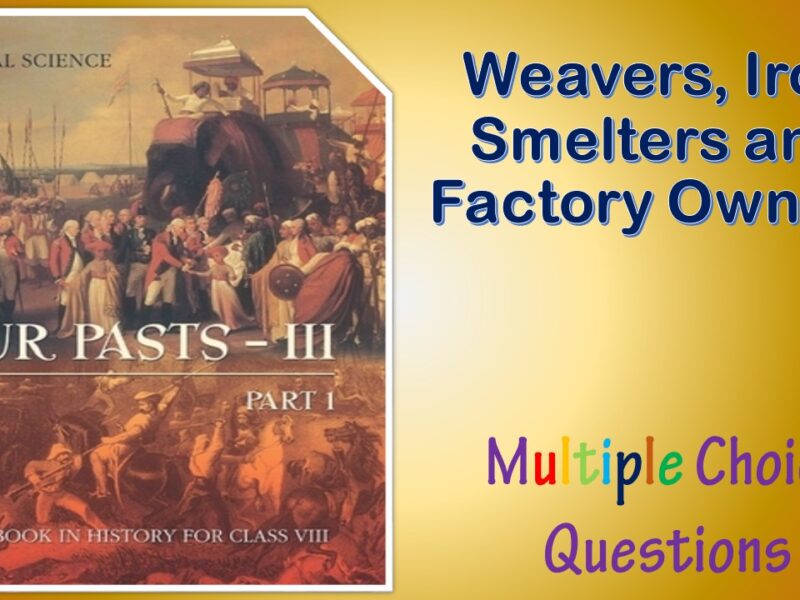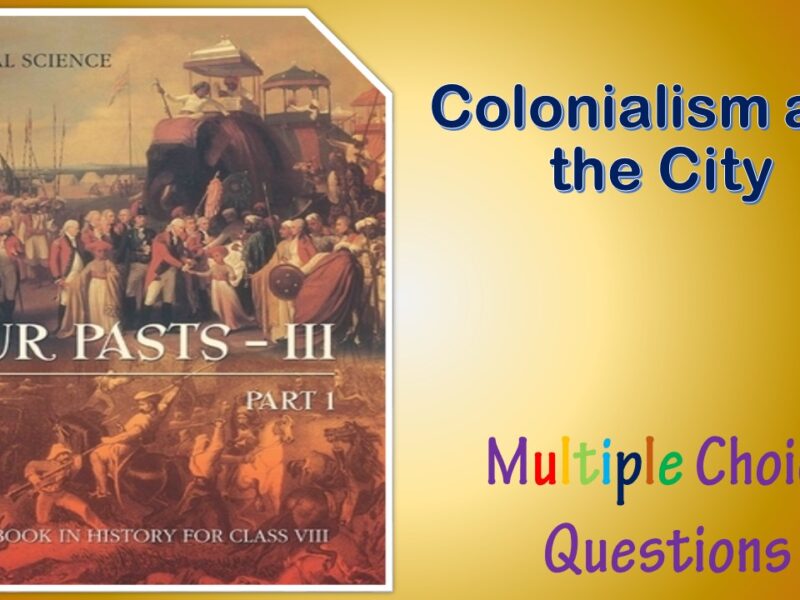Class 6 Social Science Geography MCQ Major Landforms of the Earth with Answers is Prepared Based on Latest Exam Pattern. Students can solve NCERT Class 6 Social Science Geography MCQ Major Landforms of the Earth with Answers to know their preparation level.
Students who are searching for NCERT Class 6 Social Science Geography MCQ Major Landforms of the Earth with Answers are compiled here to get good practice on all fundamentals. Know your preparation level on MCQ Questions for Class 6 Social Science Geography MCQ Major Landforms of the Earth with Answers. You can also verify your answers from the provided Class 6 Social Science Geography MCQ Major Landforms of the Earth with Answers. So, ace up your preparation with MCQ of Class 6 Social Science Geography & NCERT Textbook solutions Examinations.
CBSE Class 6 Social Science Geography MCQ Major Landforms of the Earth with Answers
Question : How plateau is differ from the mountains
(a) It is considerably higher than the surroundings
(b) Plateau is elevated flat land
(c) There are three types of mountains
(d) Its elevation is more than 600 metres
Answer : (b) Plateau is elevated flat landShow Answer :
Question : __________ is the continuous wearing down and rebuilding of the land surface
(a) Minor process
(b) External process
(c) Internal process
(d) Major process
Answer : (b) External processShow Answer :
Question : Which of the following is not a volcanic mountain
(a) Cotopaxi
(b) Rockies
(c) Fujiyama
(d) Krakatoa
Answer : (b) RockiesShow Answer :
Question : Mountains are very useful. The mountains are a storehouse of
(a) Water
(b) Gas
(c) Rice
(d) Minerals
Answer : (a) WaterShow Answer :
Question : These are large stretches of flat land
(a) River
(b) Mountain
(c) Plateau
(d) Plain
Answer : (d) PlainShow Answer :
Question : Wearing away of earth
(a) Erosion
(b) Weather
(c) Climate
(d) Horst
Answer : (a) ErosionShow Answer :
Question :Which are the most useful areas for human habitation?
(a) Plateaus
(b) Mountains
(c) Plains
Answer : CShow Answer :
Question : Which of the following relief feature is known as tablelands
(a) Plateau
(b) Mountains
(c) Hills
(d) Plain
Answer : AShow Answer :
Question : Which one of the following is the youngest folded mountain range in India?
(a) Aravalli Hills
(b) Eastern Ghats
(c) Western Ghats
(d) Himalayas
Answer : DShow Answer :
Question :These are large stretches of flat land
(a) River
(b) Mountain
(c) Plateau
(d) Plain
Answer : DShow Answer :
Question : The Salt range is in
(a) Pakistan
(b) Sri Lanka
(c) Bangladesh
(d) India
Answer : AShow Answer :
Question : Which is ideal for cultivation of crops?
(a) River valleys
(b) Flora and fauna
(c) Glaciers
Answer : AShow Answer :
Question : The wearing away of the earth’s surface is called
(a) mountains
(b)plateau
(c)erosioncorrect
(d)deposition
Answer : CShow Answer :
Question : The landforms on earth are formed by
(a) Gradual forces
(b) Tectonic forces
(c) Volcanic forces
(d) Earth forces
Answer : BShow Answer :
Question : Which of the following is not an agent of erosion and deposition
(a) Running water
(b) Glaciers
(c) Earthquake
(d) Wind
Answer : CShow Answer :
Question : Himalayan mountains & the Alps mountains are example of
(a) Fold mountain
(b) Block mountain
(c) Volcanic mountain
(d) None of these
Answer : AShow Answer :
Question : Mt. Kilimanjaro is in
(a) Asia
(b) Africa
(c) South America
(d) North America
Answer : BShow Answer :
Question : Which of the following is not a mountain?
(a) Rockies
(b) Alps
(c) Andes
(d) Prairies
Answer : DShow Answer :
Question : Rivers of ice
(a) Ice sheet
(b) Ice cubes
(c) Ice bergs
(d) Glaciers
Answer : DShow Answer :
Question : __________ forces originate from within the earth and _________ forces originate from outside the earth
(a) Volcanic and Tectonic
(b) Tectonic and Gradational
(c) Gradational and Volcanic
(d) Gradational and Tectonic
Answer : BShow Answer :
Question: Any natural elevation of the earth surface is know as —
(a) Plan
(b) Glaciers
(c) Mountain
(d) Pole
Answer : CShow Answer :
Question : What are two land forming processes
(a) Upper processes and Lower processes
(b) Block processes and Fold processes
(c) Internal processes and External processes
(d) Minor processes and Major processes
Answer : CShow Answer :
Question : Which of the following is the Peninsular plateau?
(a) Deccan
(b) Sahara
(c) Chotanagpur
(d) North
Answer : AShow Answer :
Question : Major Chinese river
(a) Tangtez
(b) Ken-zuan
(c) Yangtze
(d) Fangtze
Answer : CShow Answer :
Question : — plateau is famous for gold & diamond mining.
(a) Africa
(b) American
(c) Indian
(d) All of these
Answer : AShow Answer :
Question : The available land is not only for our use but also for
(a)future generationcorrect
(b)past generation
(c)present generation
(d)none of these
Answer : AShow Answer :
Question : Mountains are very useful. The mountains are a storehouse of
(a) Water
(b) Gas
(c) Rice
(d) Minerals
Answer : AShow Answer :
Question : _______ are lowlands where slope of the land is gradual
(a) Mountains
(b) Rivers
(c) Plains
(d) Plateau
Answer : CShow Answer :
Question : The Volcanic mountain Kilimanjaro in —
(a) Africa
(b) Japan
(c) America
(d) None of these
Answer : AShow Answer :
Question : External process leads to
(a) Sinking of the earth surface
(b) Upliftment of earth’s surface
(c) Continues wearing of the internal surface areas
(d) Continuous wearing down of the land surface
Answer : DShow Answer :
Question : Glaciers are found in:
(a) The mountains
(b) The plains
(c) The plateaus
(d) The hills
Answer : AShow Answer :
Question : The river Yangtze flows in
(a) South America
(b) Australia
(c) China
(d) Asia
Answer : CShow Answer :
Question : African plateau is famous for:
(a) Gold and diamond
(b) Iron mining
(c) Coalmining
(d) none of those
Answer : (a) Gold and diamondShow Answer :
Question : Wearing away of earth
(a) Erosion
(b) Weather
(c) Climate
(d) Horst
Answer : (a) ErosionShow Answer :
Question : In some mountains there are permanently frozen rivers of ice known as
(a) river valley
(b) glaciers
(c) plateaus
(d) none of these
Answer : (b) glaciersShow Answer :
Question : Rivers of ice
(a) Ice sheet
(b) Ice cubes
(c) Ice bergs
(d) Glaciers
Answer : (d) GlaciersShow Answer :
Question : A steep hill with an elevation of more than 600 metres is called
(a) Mountain
(b) Hill
(c) Glaciers
(d) Plains
Answer : AShow Answer :
Question : __________ forces originate from within the earth and ____ forces originate from outside the earth
(a) Volcanic and Tectonic
(b) Tectonic and Gradational
(c) Gradational and Volcanic
(d) Gradational and Tectonic
Answer : BShow Answer :
Question : The Hundru falls is in
(a) Chhotanagpur
(b) Calcutta
(c) Ranchi
(d) Chhattisgarh.
Answer : AShow Answer :
Question : Which of the following is not the type of mountains
(a) Rockies Mountain
(b) Block mountains
(c) Fold mountains
(d) Volcanic mountains
Answer : AShow Answer :
Question : The plains of Asia are formed by rivers:
(a) Ganga and Brahmaputra
(b) Yamuna
(c) Kaveri
Answer : (a) Ganga and BrahmaputraShow Answer :
Question : The continuous wearing down and rebuilding of the land surface is a/an:
(a) Internal process
(b) External process
(c) Glaciers.
(d) None of those
Answer : (b) External processShow Answer :
Question : It is a land surface higher than the local area
(a) Plateau
(b) Mountain
(c) Plain
(d) Hill
Answer : (d) HillShow Answer :
Question : These are large stretches of flat land
(a) River
(b) Mountain
(c) Plateau
(d) Plain
Answer : (d) PlainShow Answer :
Question : Mt. Kilimanjaro is situated in:
(a) India
(b) Japan
(c) Africa
Answer : (c) AfricaShow Answer :
Question : Rivers of ice
(a) Ice sheet
(b) Ice cubes
(c) Ice bergs
(d) Glaciers
Answer : (d) GlaciersShow Answer :
Question : Where is it easy to grow crops, build a house and a road?
(a) Mountain
(b) Plain
(c) River
(d) Glacier
Answer : (b) PlainShow Answer :
Question : Any natural elevation of the earth surface is know as —
(a) Plan
(b) Glaciers
(c) Mountain
(d) Pole
Answer : (c) MountainShow Answer :
Question : Which is the important mountain range of Europe?
(a) Alps
(b) Rockies
(c) Andes
(d) All of these
Answer : (a) AlpsShow Answer :
Question : These are large stretches of flat land
(a) River
(b) Mountain
(c) Plateau
(d) Plain
Answer : (d) PlainShow Answer :
Question : Mountains may be arranged in a line known as
(a) horsts
(b) range
(c) glacier
(d) all of these
Answer : (b) rangeShow Answer :
Question : Which of the following relief feature is known as tablelands
(a) Plateau
(b) Mountains
(c) Hills
(d) Plain
Answer : (a) PlateauShow Answer :
Question : Which of the following is not the type of mountains
(a) Rockies Mountain
(b) Block mountains
(c) Fold mountains
(d) Volcanic mountains
Answer : (a) Rockies MountainShow Answer :
Question : Which of the following is not an agent of erosion and deposition
(a) Running water
(b) Glaciers
(c) Earthquake
(d) Wind
Answer : (c) EarthquakeShow Answer :
Question : Where does river Yangtze flow?
(a) India
(b) Kenya
(c) China
(d) Australia
Answer : (c) ChinaShow Answer :
Question : The landforms on earth are formed by
(a) Gradual forces
(b) Tectonic forces
(c) Volcanic forces
(d) Earth forces
Answer : (b) Tectonic forcesShow Answer :
Question : The Volcanic mountain Kilimanjaro in —
(a) Africa
(b) Japan
(c) America
(d) None of these
Answer : (a) AfricaShow Answer :
Question : Wearing away of earth
(a) Erosion
(b) Weather
(c) Climate
(d) Horst
Answer : (a) ErosionShow Answer :
Question : Which is ideal for cultivation of crops?
(a) River valleys
(b) Flora and fauna
(c) Glaciers
Answer : (a) River valleysShow Answer :
Question : The Tibet plateau is the highest plateau in the world with a height of:
(a) 2000-4000 mtr.
(b) 4000-6000 mtr.
(c) 8000-9000 mtr.
Answer : (b) 4000-6000 mtr.Show Answer :
Question : African plateau is famous for:
(a) Gold and diamond
(b) Iron mining
(c) Coalmining
Answer : (a) Gold and diamondShow Answer :
Question : Which of the following is the Peninsular plateau?
(a) Deccan
(b) Sahara
(c) Chotanagpur
(d) North
Answer : (a) DeccanShow Answer :
Question : The continuous wearing down and rebuilding of the land surface is a/an:
(a) Internal process
(b) External process
(c) Glaciers.
Answer : (b) External processShow Answer :
Question : The Himalayan Mountains and the Alps are example of:
(a) Fold Mt.
(b) Block Mt
(c) Volcanic Mt.
Answer : (a) Fold Mt.Show Answer :
Question : Mt. Kilimanjaro is situated in:
(a) India
(b) Japan
(c) Africa
Answer : (c) AfricaShow Answer :
Question : Mt. Fujiyama is situated in:
(a) India
(b) Japan
(c) Africa
Answer : (b) JapanShow Answer :
Question : _______________ forces originate from within the earth and _______________ forces originate from outside the earth
(a) Volcanic and Tectonic
(b) Tectonic and Gradational
(c) Gradational and Volcanic
(d) Gradational and Tectonic
Answer : (b) Tectonic and GradationalShow Answer :
Question : The landforms on earth are formed by
(a) Gradual forces
(b) Tectonic forces
(c) Volcanic forces
(d) Earth forces
Answer : (b) Tectonic forcesShow Answer :
Question : Mt. Kilimanjaro is in
(a) Asia
(b) Africa
(c) South America
(d) North America
Answer : (b) AfricaShow Answer :
Question : Which of the following is not a volcanic mountain
(a) Cotopaxi
(b) Rockies
(c) Fujiyama
(d) Krakatoa
Answer : (b) RockiesShow Answer :
Question : The Salt range is in
(a) Pakistan
(b) Sri Lanka
(c) Bangladesh
(d) India
Answer : (a) PakistanShow Answer :
Question : Which are the most useful areas for human habitation?
(a) Plateaus
(b) Mountains
(c) Plains
Answer : (c) PlainsShow Answer :
Question : The plains of Asia are formed by rivers:
(a) Ganga and Brahmaputra
(b) Yamuna
(c) Kaveri
Answer : (a) Ganga and BrahmaputraShow Answer :
Question : Undersea mountain is:
(a) Mauna Kea
(b) Kilimanjaro
(c) Fujiyama
Answer : (a) Mauna KeaShow Answer :
Question : Which of the following is not the type of mountains
(a) Rockies Mountain
(b) Block mountains
(c) Fold mountains
(d) Volcanic mountains
Answer : (a) Rockies MountainShow Answer :
Question : What are two land forming processes
(a) Upper processes and Lower processes
(b) Block processes and Fold processes
(c) Internal processes and External processes
(d) Minor processes and Major processes
Answer : (c) Internal processes and External processesShow Answer :
Question : Which of the following is the Peninsular plateau?
(a) Deccan
(b) Sahara
(c) Chotanagpur
(d) North
Answer : (a) DeccanShow Answer :
Fill in the blanks
Question : The Deccan plateau in India is one of the ……………………… plateaus.
Answer : oldestShow Answer :
Question : In India huge reserves of ……………………… , ……………………… and ……………………… are found in the Chhotanagpur plateau.
Answer : iron, coal, manganeseShow Answer :
Question : In China, the plains are formed by river ……………………… .
Answer : YangtzeShow Answer :
Question : Permanently frozen rivers of ice are called ……………………… .
Answer : glaciersShow Answer :
Question : Horst and graben blocks are concerned to the ……………………… .
Answer : Block MountainsShow Answer :
Question : ……………………… leads to the upliftment and sinking of the Earth’s surface at several places.
Answer : Internal processShow Answer :
Question : The surface is being rebuilt by the process of ……………………… .
Answer : depositionShow Answer :
Question : Mauna Kea in the ……………………… Ocean is an undersea mountain.
Answer : PacificShow Answer :
Question : The mountains are storehouse of ……………………… .
Answer : waterShow Answer :
Question : Ural mountains are situated in ……………………… .
Answer : RussiaShow Answer :




